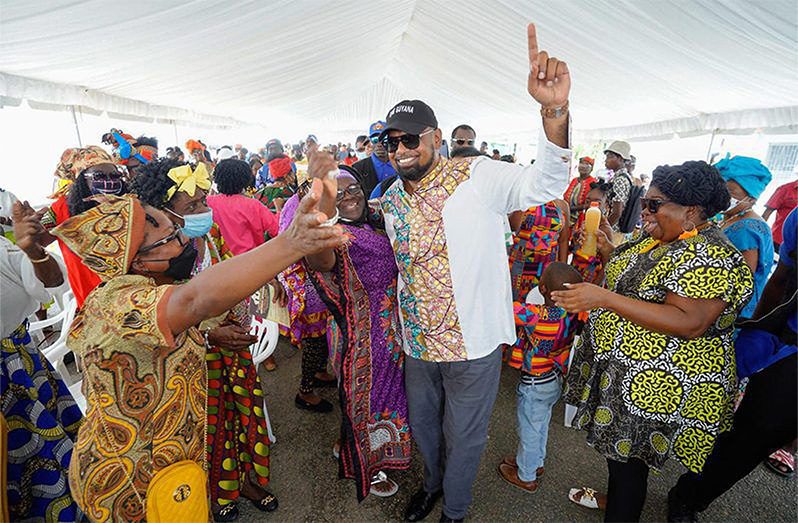PRESIDENT Dr. Irfaan Ali has emphasised that reparations for slavery must go beyond financial compensation, calling instead for a global development pact that addresses inequalities in mental health, education, healthcare, and digital access.
Ali made these remarks on the podcast: The Rest Is Politics: Leading with Alastair Campbell, making him the first sitting President from the Americas to appear on the show. This podcast deals with British and global politics.
The President underscored that the inhumane act of slavery has left deep scars that impact the social and economic aspects of the world, noting that the struggle waged by enslaved Africans and their descendants was not only for personal freedom but for systemic change that upheld human dignity and advanced societies as a whole.
He said, “The ancestors who fought slavery and fought for freedom did not for one moment fight for the freedom only of the slaves. They fought for the freedom of a system. They fought for systemic freedom, and sometimes we lose that bigger picture.
“So, although this scar is deep, I believe that the message behind that struggle for freedom is one for human dignity, is one for human advancement, is one for the forward movement of society. And it is in that context that I believe that society has graduated to a place where we do not forget their struggles, the deep wounds of slavery, the indignity of slavery.”
The President called for global cooperation on perhaps a development strategy for society’s deep scars and wounds as a result of slavery, and what constitutes that development pact.
He further reasoned: “So, the issue here is as a consequence of the impact of slavery on our societies and our economy, the mental health, because there is no assessment. And I always use one indicator. If you look at a society that has developed like the UK, and you look at your growing costs for mental health, and just using that one parameter, and looking at the impact on mental health from slavery, generational in nature, then it gives you an understanding of the type of investment that is needed on the human capital side, on the development side.”
In April, Guyana echoed its demand for justice through reparations on the international stage by the Ethnic Relations Commission (ERC), which has powerfully underscored the enduring scars of slavery, exploitation and the far-reaching consequences of colonialism.
Earlier this month, Dr. Ali reaffirmed his government’s unwavering commitment to inclusive development, declaring in his 2025 Emancipation Day message that “no Guyanese is excluded from our national development.”
The Head of State used the occasion to honour the enduring strength of African-Guyanese ancestors while calling for national unity and the rejection of divisive rhetoric.
“Today, we gather across Guyana to pay tribute to the courage, endurance, and unbreakable spirit of our African ancestors, men and women who, though subjected to the horrors of enslavement, never relinquished their dignity or humanity,” President Ali said while reflected on the brutal history of African enslavement and the indomitable spirit that overcame it.
He underscored the global condemnation of the Transatlantic slave trade as one of the “gravest crimes against humanity,” which inflicted deep scars but failed to extinguish the yearning for freedom.
That same yearning, he said, drove the post-emancipation struggle for self-determination, economic empowerment, and community-building, a legacy most powerfully reflected in the village movement.
“African-Guyanese did not merely seek freedom from bondage; they sought the power to define their own destinies and to ensure a better life for the generations to come,” the President noted.
Dr. Ali highlighted the major role of African-Guyanese in the evolution of the nation through contributions in education, entrepreneurship, governance, sports, and the arts. He called on all Guyanese to draw inspiration from their resilience and to work collectively towards a unified, just, and prosperous society.
In repudiation of racial and ethnic manipulation, the President cautioned, “Let us reject, with firm resolve, the efforts of those who seek to manipulate race and ethnicity for narrow and selfish ends. These efforts serve no one. They do not uplift communities—they only divide them. They do not solve problems; they deepen wounds. And they do not build a future, they attempt to chain us to a past we have struggled so hard to overcome.”
Instead, he urged citizens to recommit to the ideals of One Guyana, a society that values equity, justice, and shared opportunity.


.jpg)











